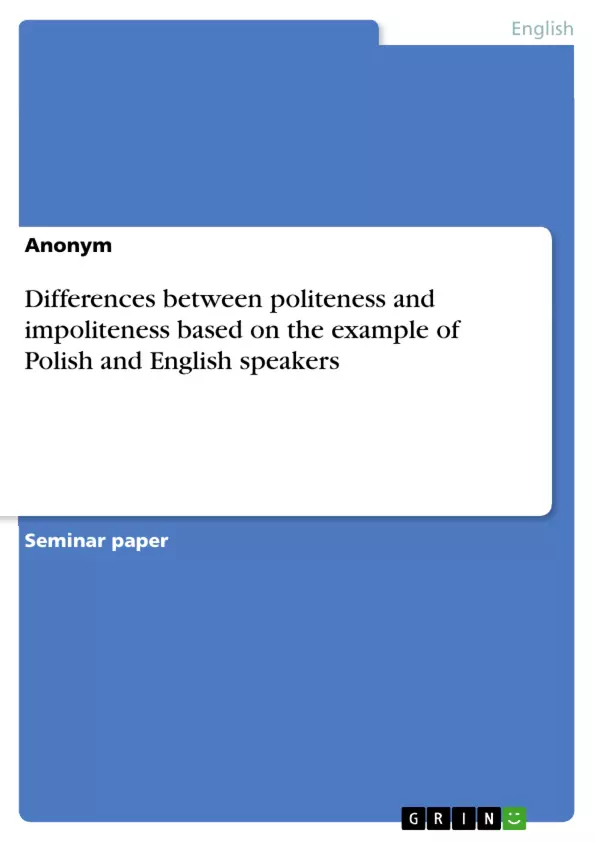In every culture, the individuals behave according to some cultural norms of the society. However, when it comes to politeness and impoliteness, those notions are dictated by the culture and language, but also personal feelings of an individual. The aim of this paper is to establish the differences between the forms of politeness and impoliteness between the Western and Eastern European culture. The representatives of Poland and United Kingdom tend to different linguistic and behavioral choices, when in particular circumstances. Speakers from Great Britain and Poland have been interviewed, in order to establish whether their idea of politeness and impoliteness is culture-based or depends rather on the individual himself. Moreover, the behavioral and linguistic pattern of the individuals was evaluated to find out, whether there are certain guidelines of politeness in the given culture.
Inhaltsverzeichnis (Table of Contents)
- Abstract
- Introduction
- General theory of politeness
- Politeness in the United Kingdom
- Politeness in Poland
- General theory of impoliteness
- Empirical research: Interviews of English and Polish speakers
- Summary
Zielsetzung und Themenschwerpunkte (Objectives and Key Themes)
This paper examines the differences in politeness and impoliteness between Western and Eastern European cultures, specifically focusing on Poland and the United Kingdom. It aims to understand if these differences are rooted in culture, individual personality, or a combination of both. The paper analyzes linguistic and behavioral patterns to establish if there are established guidelines for politeness in each culture.
- Cultural influences on politeness and impoliteness
- Individual factors contributing to politeness and impoliteness
- Linguistic and behavioral manifestations of politeness and impoliteness
- Comparison of politeness norms in Poland and the United Kingdom
- The role of "face-saving" in politeness strategies
Zusammenfassung der Kapitel (Chapter Summaries)
- The abstract introduces the topic of the paper and outlines its goals, focusing on the cultural differences in politeness and impoliteness between Poland and the United Kingdom. It explores the potential influence of culture and individual personality on these differences.
- The introduction discusses language as a primary means of human communication, highlighting how cultural background shapes communication styles and the perception of politeness and impoliteness. The chapter emphasizes the cultural relativity of politeness and introduces the research focus on interviewing Polish and British speakers to understand their perspectives on these concepts.
- This chapter delves into the general theory of politeness, exploring different perspectives and definitions of the term. It introduces the "face-saving" theory of Brown and Levinson (1987), which suggests that individuals utilize language to maintain a positive public image. The chapter also discusses Leech's (2014) critique of the Brown and Levinson model, emphasizing its potential Western bias and proposing alternative perspectives on politeness.
Schlüsselwörter (Keywords)
This paper focuses on the key concepts of politeness, impoliteness, cultural differences, linguistic behavior, face-saving, and empirical research. It analyzes the contrasting perceptions of politeness and impoliteness in Polish and British cultures, exploring the influence of language and behavior in shaping these differences. The paper highlights the significance of understanding cultural norms in communication and the impact of individual personality on politeness strategies. It draws upon established theories like Brown and Levinson's face-saving model and Leech's perspective on politeness.
- Arbeit zitieren
- Anonym (Autor:in), 2018, Differences between politeness and impoliteness based on the example of Polish and English speakers, München, GRIN Verlag, https://www.hausarbeiten.de/document/1278192


